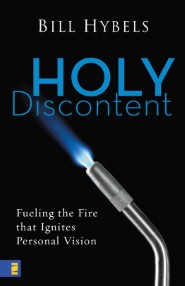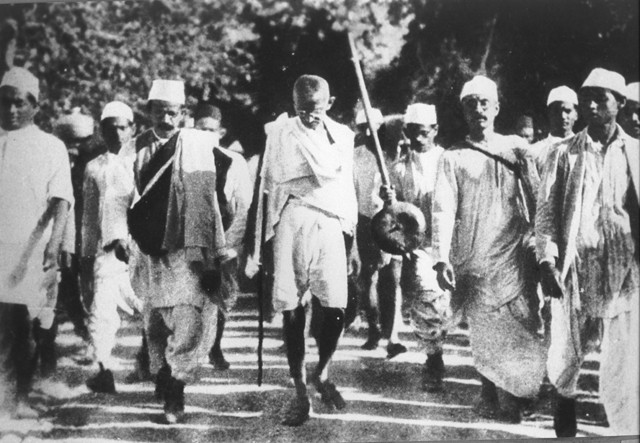Holy Discontent
 My husband gave me this book for Christmas because it seemed to relate to discussions we’ve been having on the subject of calling. Both of us have a certain restlessness about where we are right now, and a certain pent up excitement about things we’re reading and learning. What to do with it?
My husband gave me this book for Christmas because it seemed to relate to discussions we’ve been having on the subject of calling. Both of us have a certain restlessness about where we are right now, and a certain pent up excitement about things we’re reading and learning. What to do with it?
This book by Bill Hybels of Willow Creek Community Church (which, I should mention, neither of us had read before) argues that what you should do with it is feed it. He distinguishes “holy” discontent as the kind of stirring that drives you toward positive action:
Your “one thing” is the stirring situation that causes so much damage to your soul that it brings you to your own Popeye moment — a place where you feel you simply must do something. Your “one thing” births a burning-bush experience in your soul where you sense God himself inviting you into an intentional and personalized partnership with him to renovate reality.
What does he mean by “Popeye moment”? He elaborates on it here:
I would put this book in the motivational/inspirational category. Hybels includes a number of stirring illustrations of people who have found their “one thing” and their life trajectories changed forever — and improved the human lot in significant, lasting ways. It’s the kind of book that sets a single idea before you and asks you to think about it long and hard.
My only complaint is a small one, more an impression than a criticism: the book seems to speak mainly in the terms of those who are activists by temperament. I had to keep shushing my defensiveness about this so that I wouldn’t miss the good things Hybels has to say. I’m not an activist of the sort that he is, and the book forced me to be constantly translating it into the terms of my more contemplative nature. I may not know the first thing about how to create an organization that addresses a pressing social need, but there is still a need for me to lock in more deliberately on the purpose I’m called to give myself to.
 I’m an idea person; ideas excite me. Ideas change the world. Most of the world’s problems begin with faulty thinking, and most of the solutions begin with a corrective (or a discovery) at that ground level of ideas. So those of us who thrive in the quiet world of thought don’t need to feel that we can have no influence. Temperamental differences like “activist” or “contemplative” may describe how we experience truth, but they don’t change the truth — in this case, the truth that God’s calling will have an impact on the world, whether it comes through a dramatic Popeye moment or not, whether it comes through social activism or through quieter means.
I’m an idea person; ideas excite me. Ideas change the world. Most of the world’s problems begin with faulty thinking, and most of the solutions begin with a corrective (or a discovery) at that ground level of ideas. So those of us who thrive in the quiet world of thought don’t need to feel that we can have no influence. Temperamental differences like “activist” or “contemplative” may describe how we experience truth, but they don’t change the truth — in this case, the truth that God’s calling will have an impact on the world, whether it comes through a dramatic Popeye moment or not, whether it comes through social activism or through quieter means.
For the person who has already locked into what frustrates them most, or for the person still trying to hone in on it, Holy Discontent calls you out of self-absorption and sensitizes you to the ways God may be trying to move you into a different phase. There is a distinction Hybels draws toward the end between two states of being: the “normal state,” and the “fundamental state.” The distinction comes from University of Michigan business professor Robert Quinn. Hybels summarizes it by explaining that in the normal state,
you’re almost entirely self-absorbed. You have a reactive approach to life. And you try to maintain the status quo, regardless of how unbearable the status quo is… The normal state is so self-seeking that you can spin your wheels for a lifetime and never once impact the world around you. In the fundamental state, however, people care so much about getting results that they begin to move and breathe in a totally different realm. They operate with intentionality. They act with massive doses of enthusiasm and patience. They surrender their ego because the cause simply can’t afford their pride… They take risks they wouldn’t normally take… Their creativity kicks up a notch. Their energy soars. Their passion swells.
It captures the contrast between life before, and after, the moment of calling. In some way, this seems related to the parable of the four soils (in Luke 8), which I’ve had in mind lately. “Take care how you listen,” Jesus says, “for whoever has, to him more shall be given; and whoever does not have, even what he thinks he has shall be taken away from him.” It sounds rather harsh or unfair initially, but it’s only the truth: our orientation can make or break the harvest of our spiritual lives. The fundamental state seems to describe the heart with good soil in this parable. Quinn believes that we can migrate at will from one state to another, and this makes sense if we think in terms of how we’re tending the soil of our hearts. We can’t produce the moment of calling, but we can work to maintain a rich, absorbent heart attuned to God’s voice and ready for whatever seed he is preparing to plant.




One Comment
hopeinbrazil
Thank you for your insights on this book which I had not heard of before.